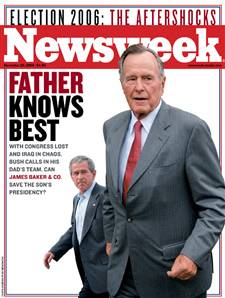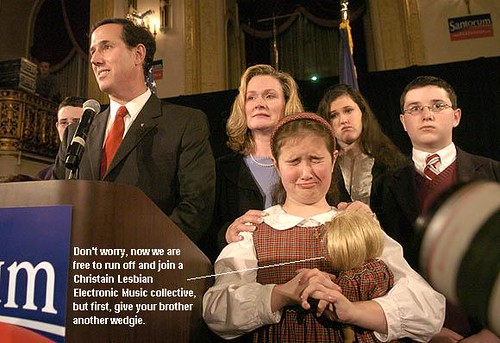Since I did so well on my last set of predictions, I'm going to pick up a subject
BooMan started: who will get the Republican presidential nomination in 2008? Three early favorites--Santorum, Allen, and Frist--are now sunk. Giuliani is not going to happen, and neither is McCain (too scandal-plagued and too hated, respectively). Newt Gingrich is a pick of the Washington chatterers, but he hasn't held office in a long time, he has a lot of negative baggage, and just forget about it. Honestly, I don't think Republican primary voters are going to want any Washington insider by 2008, so except for Sam Brownback (Santorum with better hair and without the weirdly pointy chin), forget the usual suspects.
I'm guessing a governor. In that BooMan thread
TarheelDem runs down the list of R governors with adequate experience:
Riley (AL) - National appeal? Really?
Schwarzenegger (CA) - Prohibited by the Constitution - foreign-born
Rell (CT) - Too moderate?
Perdue (GA) - Interesting possibility for motivating the base
Lingle (HI) - Unlikely - unlikely as AR (wait a minute)
Barbour (MS) - Could move the big money
Blount (MO) - Daddy's boy - not after W
Heineman (NE) - A dark horse
Hoeven (ND) - Another dark horse
Carcieri (RI) - Could he stand the scrutiny of a campaign
Sanford (SC) - Almost too crazy for SC - not electable on national ticket
Rounds (SD) - Failed to deliver on abortion referendum
Perry (TX) - Another Texas governor? Not for a generation
Huntsman (UT) - Probably has the negatives that Romney has without the charm
Douglas (VT) - Another dark horse
Another commenter adds Tim Pawlenty, recently reelected governor of Minnesota. Also add recent ex-governor of Massachusetts Mitt Romney. Both are relatively charming, have decent conservative credentials, and could win states outside the South. Both dangerous. Mike Huckabee is generally considered a good contender, and I also think Haley Barbour has a strong chance, based in part on an obvious contrast he can draw to George W. Bush: he responded with relative competence to Katrina. In other words, your Republican presidential nominee will probably be one of these
five four fresh faces:
Mitt Romney (former governor of Massachusetts):

Tim Pawlenty (current governor of MN):
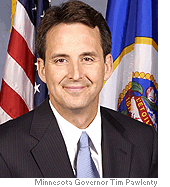
Sam Brownback (Kansas Senator):
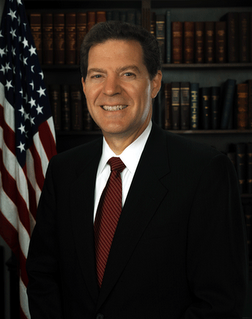
Mike Huckabee (governor of Arkansas)
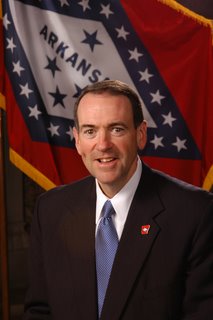
Haley Barbour (governor of Mississippi) (see Update IV)
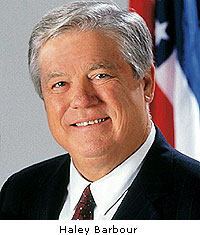
These guys are all
waaaaaay to the right (except for Romney, who's only mostly to the right), untouched by the scandals that just took out the Republican Congress, and used to the cameras. Don't be fooled by Tuesday: voters didn't reject conservatism with a friendly face. They rejected a bunch of corrupt incompetents who lost us a war. If a smiley right-winger comes along who promises to be halfway competent and who bears no responsibility for Iraq, he'll have the same advantages George W. Bush had: nothing fundamental has changed about the conservative-friendly media environment. (For a dissection of the media's continuing failure, see, as always,
Matt Taibbi. If that's not enough,
here's more from Jamison Foser.)
In the next couple of days I may do one of these for the Democrats. My gut feeling is that our pool of talent is weaker, in part because until Tuesday we had fewer governorships and Senators never win.
UPDATE:
Bouldin argues that Romney suffers the George Pataki problem minus the policy failure: he led his state party to utter humiliating defeat. I probably also should have mentioned BooMan's argument against Romney in that post I initially linked to: 17 percent of Americans say they would have reservations about voting for a Mormon. Romney is out.
UPDATE II:
Jay's enthusiasm convinced me Romney can generate some. He's back in. I'm keeping the possible hurdles up, though.
UPDATE III:
Ok, on McCain, because Solomon asked: Polls at this point are meaningless. All they reflect is name recognition and general media deep-throatage. Think back to 2002. Lieberman was
crushing the polls for the Democratic nomination and everyone just knew he would be the nominee. There's a lot of distrust of McCain among conservative Republicans, and that's not going to go away just because he makes nice with a few leaders. Meanwhile, if Democrats play their cards right over the next few years (a big if, I know), they should be able to force him into votes that wedge him away from either moderates or conservatives.
Now, a version of the following argument seems to be a kind of CW among lefty bloggers.
Here it is expressed by rwallnerny:
The republicans are an orderly bunch. They don't nominate insurgents or outsiders. They usually nominate whoever it is that is seen as next in line. This time McCain will get support based on the idea that its "his turn."
Here's another version:
The Republicans are the party of primogeniture. They always nominate the next one in line.
With the unique break-through exception of Barry Goldwater in 1964, the Republicans have followed this rule rigorously since the Second World War. And there is no Barry Goldwater available in 2008.
Even when it will be an obvious disaster (Ford in '76, Dole in '96) the R's hold tight and follow their eminent successor.
If Jeb runs (which looks unlikely), then he will be the nominee. If Jeb doesn't run, you should start keeping fluffy indoors because it'll be Dr. Frist.
I don't know how people square that with the noises many conservatives have been making that Republicans lost Congress because they didn't adhere to conservative principles (a version of the "Communism-has-never-been-tried" of die-hard Trots). I'm also not sure where the "Republicans go for the next in line" idea came from in the first place. Looking back over the last 40 or so years of Republican presidential candidates, I only see four elections where there wasn't an overwhelming, dominating Republican favorite: 1964, 1980, 1996, and 2000. In 1964, Barry Goldwater wasn't obviously "next in line." In 1968, Nixon ran more or less unopposed for the Republican nomination. In 1976, an insurgent Ronald Reagan almost took out a sitting president. In 1980, George H.W. Bush won Iowa but then Reagan destroyed him--probably the best example of the "next in line" theory I can find. In 1996 there was no obvious "next in line," and Bob Dole emerged from a very strange field where Colin Powell was the dream candidate, and Pat Buchanan and Steve Forbes racked up some early primary wins. In 2000, George W. Bush won because he had the most money and the backing of other governors--frankly, it was more McCain, Orrin Hatch, or Lamar Alexander's "turn" in that election than it was GWB's.
Put yourself in the shoes of a Republican primary voter. Are you going to vote for your party's version of Joe Lieberman (self-involved, making a big show of principle but basically lacking any, and beloved mainly by media elitists) if you suddenly see viable alternatives? Especially viable, young, energetic alternatives? One or more anti-McCains will emerge over the course of 2007, and by the end of the year he'll find himself in Lieberman's three-way tie for third.
On a different note: someone with knowledge of Republican politics told me Haley Barbour has announced he won't seek the nomination. I can't find any confirmation of that online, but I will keep looking.
And on
Huckabee:
He's got that overcoming obesity thing going for him--people love a story about personally triumphing over a weight problem. Almost anyone can relate to that. He's got that non-political book about it, and he wisely stayed away from a lot of conservative rhetoric while he was doing his book tour. As a result, he seems like a great, hard-working guy to millions of people who don't know anything about his scary beliefs. The media will not take on that guy. We won't be able to tie him to the DC Republican corruption either. He would be a very tough candidate.
Democrats shouldn't delude themselves that McCain is the most formidable candidate they could face in a general. It will be easier, in some ways, for a non-Washington Republican candidate to pull a Richard Nixon and claim a secret plan to get us out of Iraq, without having to face the media's indulgence of "cut and run" rhetoric, since everyone knows Republicans are tough, real men on issues of war.
UPDATE IV:
Ok, duhh. Barbour ruled out a presidential run
way back in February.






